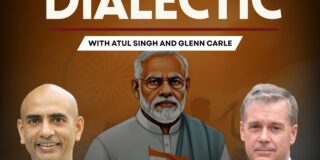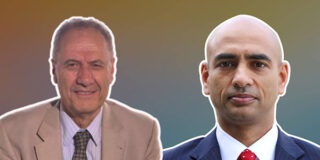Antoine van Agtmael is a legendary investor who came up with the term “emerging markets” and was the Chair of the Board of Trustees of the National Public Radio (NPR) Foundation. His distinguished track record as an investor and his rich professional career makes van Agtmael uniquely suited to read the tea leaves for the global economy and the future of clean tech.
With Fred Bakker, van Agtmael is the author of The Smartest Places on Earth: Why Rustbelts Are the Emerging Hotspots of Global Innovation. Earlier in his career, van Agtmael authored The Emerging Markets Century: How a New Breed of World-Class Companies Is Overtaking the World. Few understand the big trends shaping the world better than van Agtmael. Given his track record, his views on the future of our planet are immensely important.
What’s Next for Emerging Markets?
For decades, globalization has raised the fortunes of developing nations. Now, international tensions between the US-led West and Russia-China are upending not only globalization but also the global postwar order. The Russia-Ukraine War has led to Western sanctions. The West has cut off Russia from international markets. For the first time since World War II, a major war has come to Europe.
Even as tensions with Russia have risen, the US and China seem to be in a headlong collision. They seem to be in the Thucydides Trap, a term that Harvard’s Graham Allison used to describe a clash between a ruling and a rising power. China has poured money into massive projects and initiatives such as the Belt and Road Initiative. In such a scenario, the world is deglobalizing. This puts into question the future of emerging markets. In this new scenario, can they keep growing?
Van Agtmael believes things will become tricky for emerging economies. Cheap labor is being replaced by robotics, additive manufacturing, and artificial intelligence. Those countries that can supply relevant raw materials and new forms of manufacturing will thrive. Issues of security will increasingly play a role in configuring supply chains and the destiny of the global economy.
What’s Next for India?
India’s economy continues to grow, a “bright spot” for the world, according to International Monetary Fund (IMF) Managing Director Kristalina Georgieva. Under Prime Minister Narendra Modi, the Indian government has become more business-friendly. The economy has grown impressively. Sectors like manufacturing, information technology, and pharmaceuticals are doing very well.
Social mobility is now improving. More Indians are becoming entrepreneurs and professionals. In summary, economic growth has created a rapidly growing middle class. Van Agtmael thinks that India would have to navigate tricky geopolitics. As its economy grows, India will become a major power in the emerging multipolar world.
Global Inequality
Both income and wealth inequality has risen worldwide. This threatens social cohesion and progress. Many feel that governments serve elites, not the people. Van Atgmael believes that addressing inequality is essential for preserving democracy but politicians have failed to address this issue. As a result, right-wing governments and far-right movements have emerged. They oppose trade, propose self-sufficiency, and are moving away from globalization.
As someone with a rich experience in both business and public policy, van Agtmael proposes higher taxation as well as institutional reform. He argues that increasing social mobility through improved opportunities is essential to preserve liberal democracy.
[Matthew Knudson wrote the first draft of this podcast description.]
The views expressed in this article are the author’s own and do not necessarily reflect Fair Observer’s editorial policy.















Comment